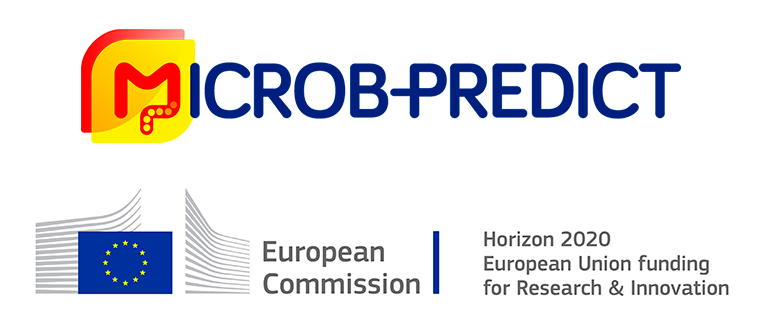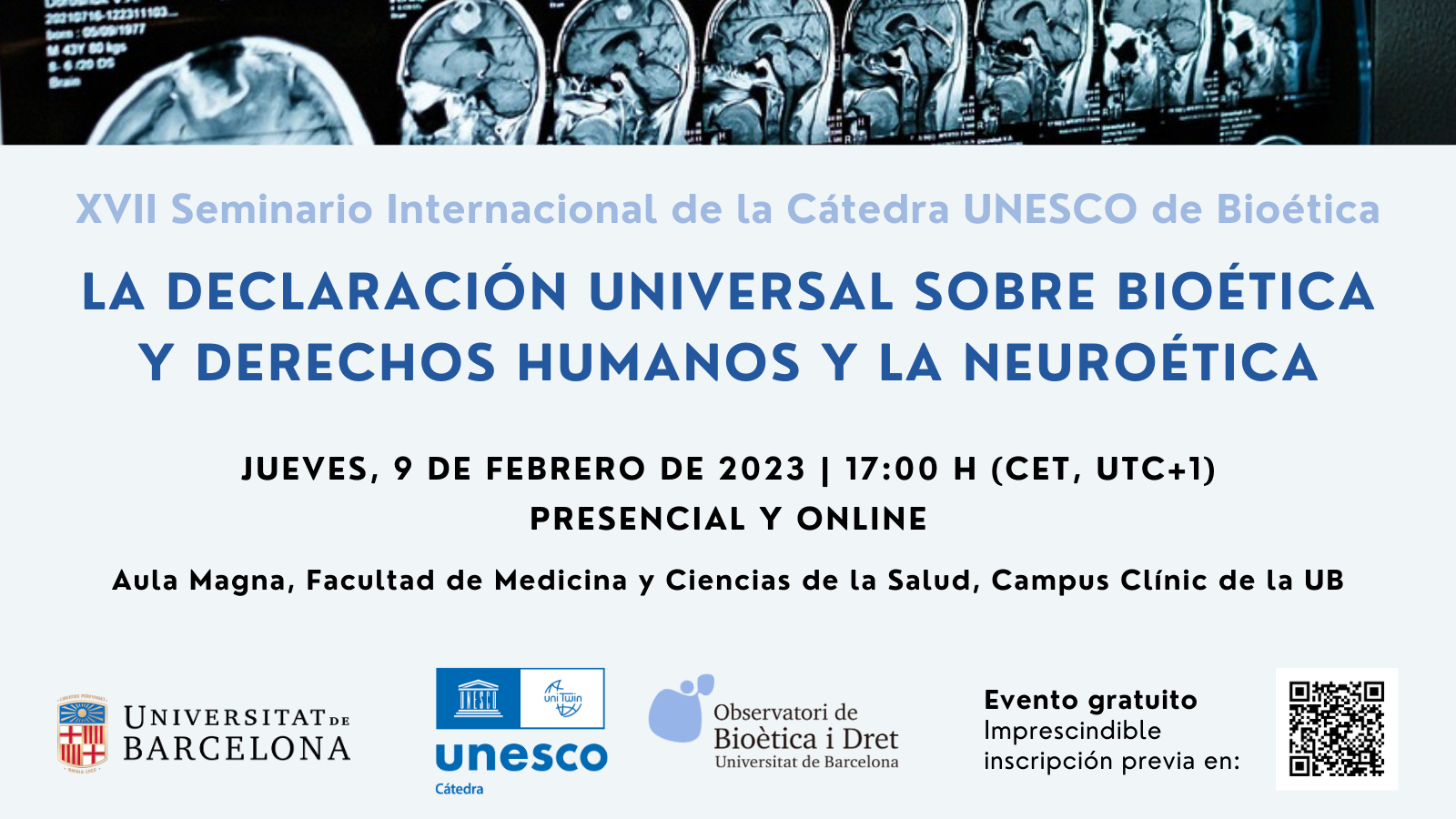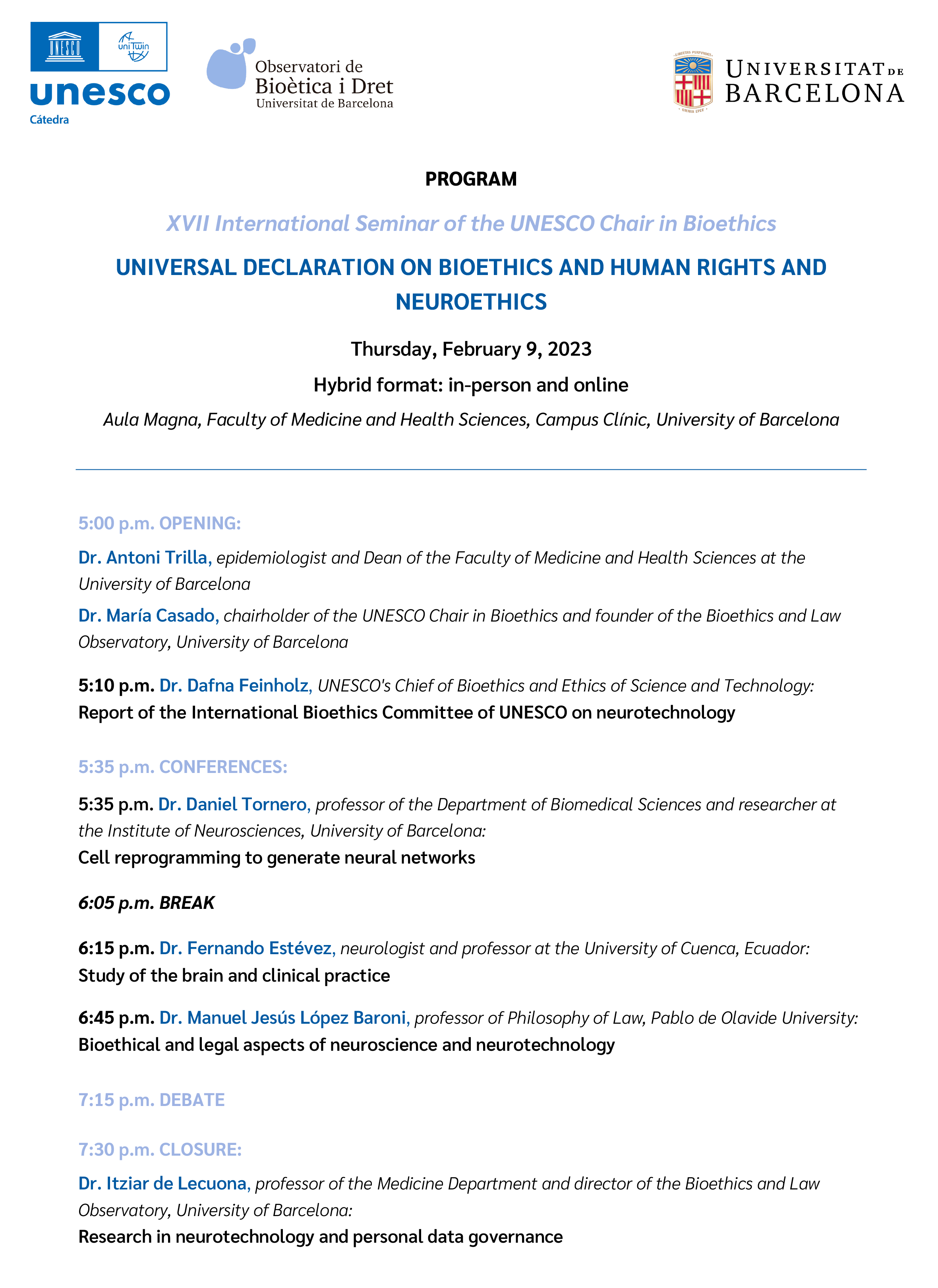The Bioethics and Law Obs.
Master in Bioethics and Law
UNESCO Chair in Bioethics
Contact
- Bioethics and Law Observatory
- UNESCO Chair in Bioethics
- University of Barcelona
- Faculty of Law
- Ave. Diagonal, 684
- 08034 Barcelona
- (+34) 93 403 45 46
- obd.ub@ub.edu
- Master in Bioethics and Law
- (+34) 93 403 45 46
- master.bd@ub.edu
RSS del Observatori de Bioètica i Dret UB
-
The Bioethics and Law Observatory publishes the document “Bioethics and polygenic risk scoring of human embryos”, coordinated by Gemma Marfany and Itziar de Lecuona
The Opinion Group of the Bioethics and Law Observatory at the University of Barcelona has published the document “Bioethics and polygenic risk scoring of human embryos”.
Since 2000, the Group has published several reports discussing the ethical, legal and social implications of assisted human reproduction. These reports have had a remarkable regulatory impact, as seen in the Spanish Assisted Reproduction Act (14/2006) and Biomedical Research Act (14/2007), which include several of the Group’s recommendations.
The objective of all these documents, available in open access, is to promote the dialogue between academia and society with the goal of empowering individuals to make free and informed decisions.
For this reason, the Group has developed this new report, with the purpose of revisiting this topic in light of current advances in genetic diagnosis of complex polygenic diseases.
Modern genome sequencing techniques allow scientists to obtain more information than ever on the genetic makeup of cells and organisms, including people, something that can be (and already is) exploited in a context of commodification of the human body and its parts.
All of that raises many bioethical questions, which are discussed in the document.
Abstract:
Currently, some assisted reproduction and genetic clinics offer parents the possibility to select their embryos according to a polygenic risk score.
The selection is based on the probability that their offspring may develop certain diseases or undesirable characteristics in adulthood (examples include type 2 diabetes or cardiovascular problems, but also short stature or level of intelligence).
The calculation of a polygenic risk score is not comparable to the genetic diagnosis of Mendelian (i.e. monogenic) disorders, which does have a high level of certainty when the causative gene or genes are known.
Conversely, the etiology of these diseases is polygenic and multifactorial, involving genetic variants in multiple genes. Not all the genes influencing these characteristics, or their respective proportions, are known. In addition, the contribution of the environment —often pivotal— is frequently underappreciated.
Currently, numerous in vitro fertilization (IVF) clinics in the United States provide polygenic risk score tests to predict cognitive abilities, often in addition to pre-implantation genetic testing of Mendelian disorders, within the same package. Diagnostic tests with clinical value are thus conflated, deceptively, with tests for the genetic selection of embryos possessing certain “guaranteed” characteristics which are unrelated to any actual disease.
This situation highlights relevant scientific gaps and raises bioethical questions, as it manifestly falls within the domain of “genetic improvement”.
The document analyzes the state of the art and includes a series of conclusions and recommendations to address the problem.
Authors and collaborators:
The report gathers the contributions and knowledge of various members and collaborators of the Bioethics and Law Observatory, and of lecturers of the Master in Bioethics and Law at the University of Barcelona.
It has been written and coordinated by Dr. Gemma Marfany, Full Professor of Genetics at the Faculty of Biology at the University of Barcelona; and Dr. Itziar de Lecuona, Associate Professor at the Department of Medicine and director of the Bioethics and Law Observatory at the University of Barcelona.
Significant contributions were made by: Dr. Manuel Jesús López Baroni, Associate Professor of Philosophy of Law at the Pablo de Olavide University; Dr. Josep Santaló, Full Professor of Cellular Biology at the Autonomous University of Barcelona and specialist in reproduction; Dr. María Casado, Full Professor of Philosophy of Law, Moral and Political Philosophy and UNESCO Chair in Bioethics at the University of Barcelona; and Dr. Anna Veiga, biologist, expert in human reproduction and director of the Stem Cell Bank of Barcelona at the Bellvitge Biomedical Research Institute (IDIBELL).
You can read the previous reports published by the Bioethics and Law Observatory about the ethical, legal and social implications of assisted human reproduction in the following links:
- Document on bioethics and gene editing in humans (2016)
- Document on genetic tests of filiation (2006)
- Declaration on gender selection (2003)
- Document on oocyte criopreservation for human reproduction (2002)
- Declaration on embryonic stem cells (2001)
- Document on oocyte donation (2001)
- Declaration on embryo research (2000)
This publication is part of the results of the R&D&I project “Cuestiones bioéticas no resueltas en la evaluación de la investigación e innovación en salud basada en inteligencia artificial, tecnologías genéticas y datos personales (BIOEVAINNOLAW)” (PID2022-138615OB-I00), funded by MICIU/AEI/10.13039/501100011033 and FEDER/UE. Principal researcher: Itziar de Lecuona.

-
Bioethics and polygenic risk scoring of human embryos
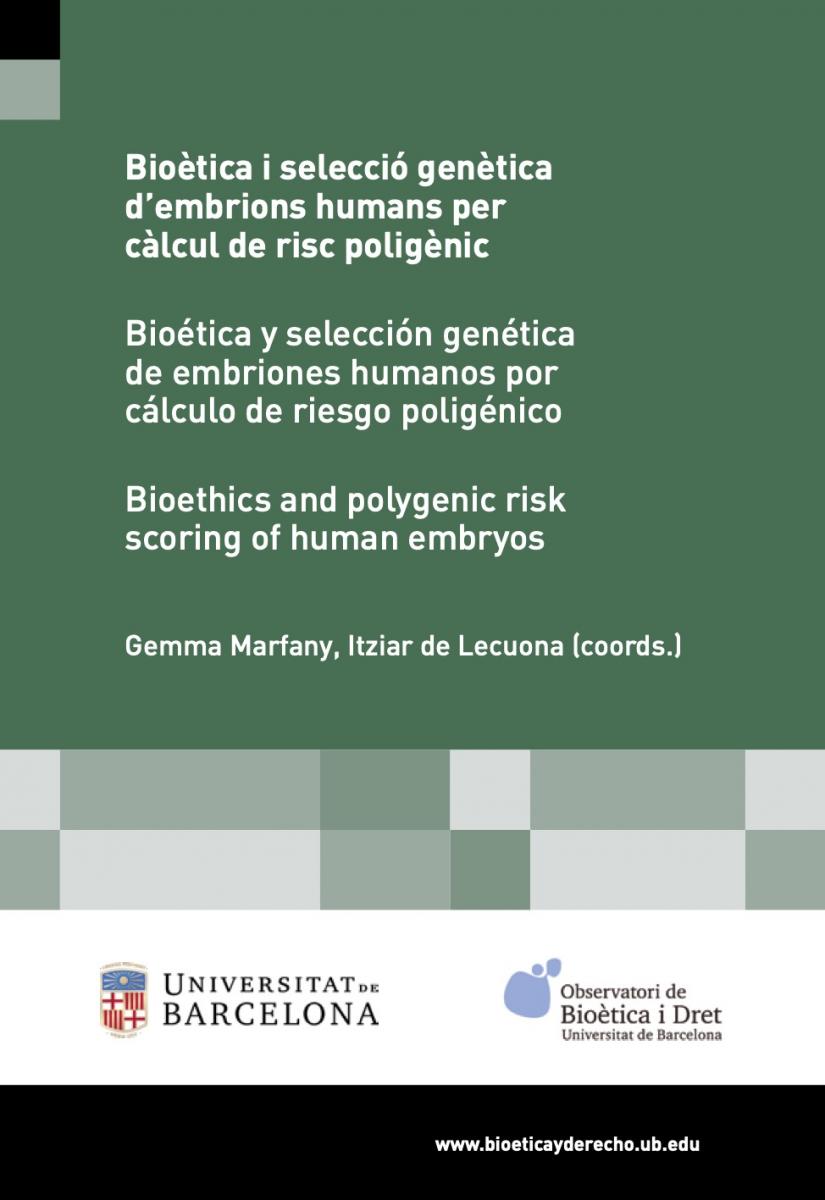 Authors: Gemma Marfany and Itziar de Lecuona
Authors: Gemma Marfany and Itziar de Lecuona- Publication date: March 2024
- Document [PDF]
- More information
This publication is part of the results of the R&D&I project “Cuestiones bioéticas no resueltas en la evaluación de la investigación e innovación en salud basada en inteligencia artificial, tecnologías genéticas y datos personales (BIOEVAINNOLAW)” (PID2022-138615OB-I00), funded by MICIU/AEI/10.13039/501100011033 and FEDER/UE. Principal researcher: Itziar de Lecuona.
-
MICROB-PREDICT 6th General Assembly Meeting in Ljubljana, Slovenia
From March 20 to 22, 2024, the 6th General Assembly (GA) Meeting of the European project “MICROB-PREDICT. Microbiome-based biomarkers to predict decompensation of liver cirrhosis and treatment response” will take place in Ljubljana, Slovenia.
The MICROB-PREDICT project, within the framework of the Horizon 2020 Programme, aims to develop personalized microbiome-based treatment strategies to prevent and treat decompensated cirrhosis and acute-on-chronic liver failure (ACLF), and reduce mortality in patients who suffer from these diseases.
Dr. Itziar de Lecuona, associate professor of the Department of Medicine and director of the Bioethics and Law Observatory at the University of Barcelona, will participate in the meeting as leader of the Work Package (WP) “Ethics, health, and socio-economics”, presenting the progress and results of the team. This work package addresses the several ethical, legal and socioeconomic issues that arise during the development of the project.
Additionally, on Friday, March 22, at 10:05 a.m., Dr. de Lecuona will offer a masterclass on “Ethics perspective of using GPT for science”.
-
Date: from Wednesday, March 20 to Friday, March 22, 2024
-
Location: Ljubljana, Slovenia
-
-
Call for papers on "Mobility of human biomaterials intended for reproduction" for the Revista de Bioética y Derecho
The Revista de Bioética y Derecho of the University of Barcelona, in collaboration with Dr. Marc-Abraham Puig Hernández, Lecturer on Philosophy of Law, Dpt. of Political Sciences and Public Law of the U. Autònoma of Barcelona, announces this call for papers for a monographic issue on “Mobility of human biomaterials intended for reproduction”.
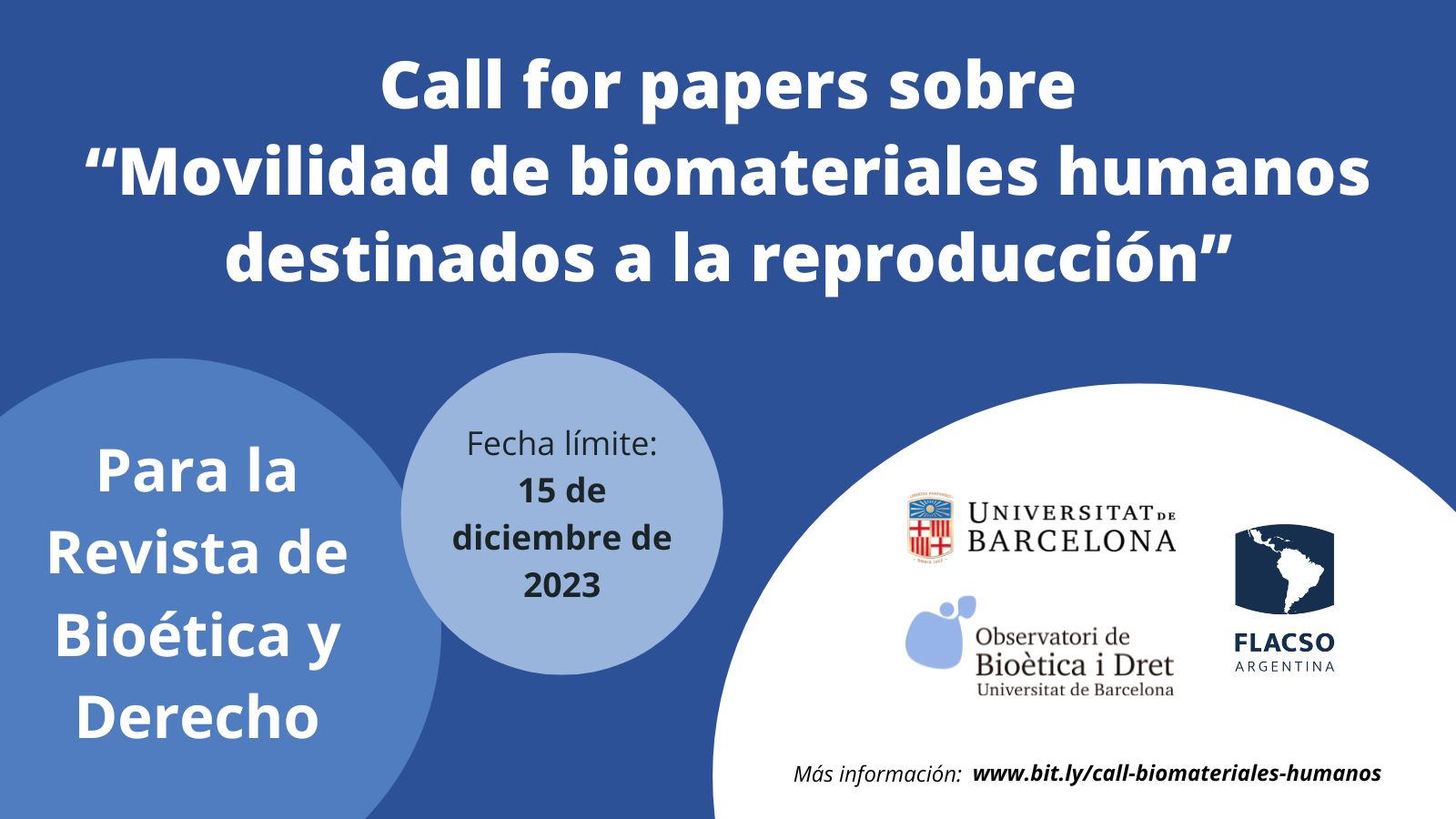 The mobility of human biological material intended for reproduction (oocytes, semen, embryos) makes it possible to dispose of and use these biomaterials in a different place than where they were obtained. The phenomenon of oocyte vitrification and biobanks gave this issue renewed vigour.
The mobility of human biological material intended for reproduction (oocytes, semen, embryos) makes it possible to dispose of and use these biomaterials in a different place than where they were obtained. The phenomenon of oocyte vitrification and biobanks gave this issue renewed vigour.The human biomaterials supply chain encompasses, at a minimum, the collection, evaluation, storage, and distribution of gametes and embryos. Each of these phases has provided participants with specific profiles and functions to carry out assisted human reproduction.
Spain has established itself as a leading supplier of human-derived reproductive biological samples. A phenomenon that warrants further investigation, given the limitations imposed by the legislation. However, collaboration between field observation and participants is required to enable an analysis of issues such as:- The volume of oocytes, semen and embryos stored and regulation on logistics and transport.- The conditions necessary to ensure the storage of this type of samples.- The weight of the decisions and criteria of embryologists, gynecologists, transporters, and other participants in this chain.- Technical, biological, and material requirements for the transfer of samples.- Ethics of obtaining, using, and disposing of human biomaterials for reproduction.- Affectation on samples due to mobility between national and international clinics.- The relationship between the participants in the donation and the destination of the samples.- The role of national registries and the guarantee of traceability.- The routes followed for mobility include the origin of samples and the criteria for choosing those from one country and not another.- Market vs. universal access in accessing oocytes, semen, and embryos.The journal will accept only original papers written in Spanish, Catalan, French, English, Portuguese or Italian, with a maximum length of 6,000 words (excluding abstract, keywords, notes, references, bibliography, funding). The file must be sent in MS Word format, font Cambria or Arial 12, 1.5 spaced, thoroughly following the guidelines for authors.
Articles must be sent through this link to the “Monographic Dossier” section. They will be peer-reviewed and those that pass the selection process will be accepted for publication.-
Deadline for submissions: December 15, 2023 (1 p. m. CET)
-
Call for papers on "Neuroethics" for the Revista de Bioética y Derecho
The Revista de Bioética y Derecho of the University of Barcelona announces this call for papers for a monographic issue on “Neuroethics”, in collaboration with Dr. Itziar de Lecuona, associate professor of the Medicine Department and director of the Bioethics and Law Observatory at the University of Barcelona, and Dr. Fernando Estévez, neurologist and professor in the Faculty of Medical Sciences at the University of Cuenca (Ecuador).
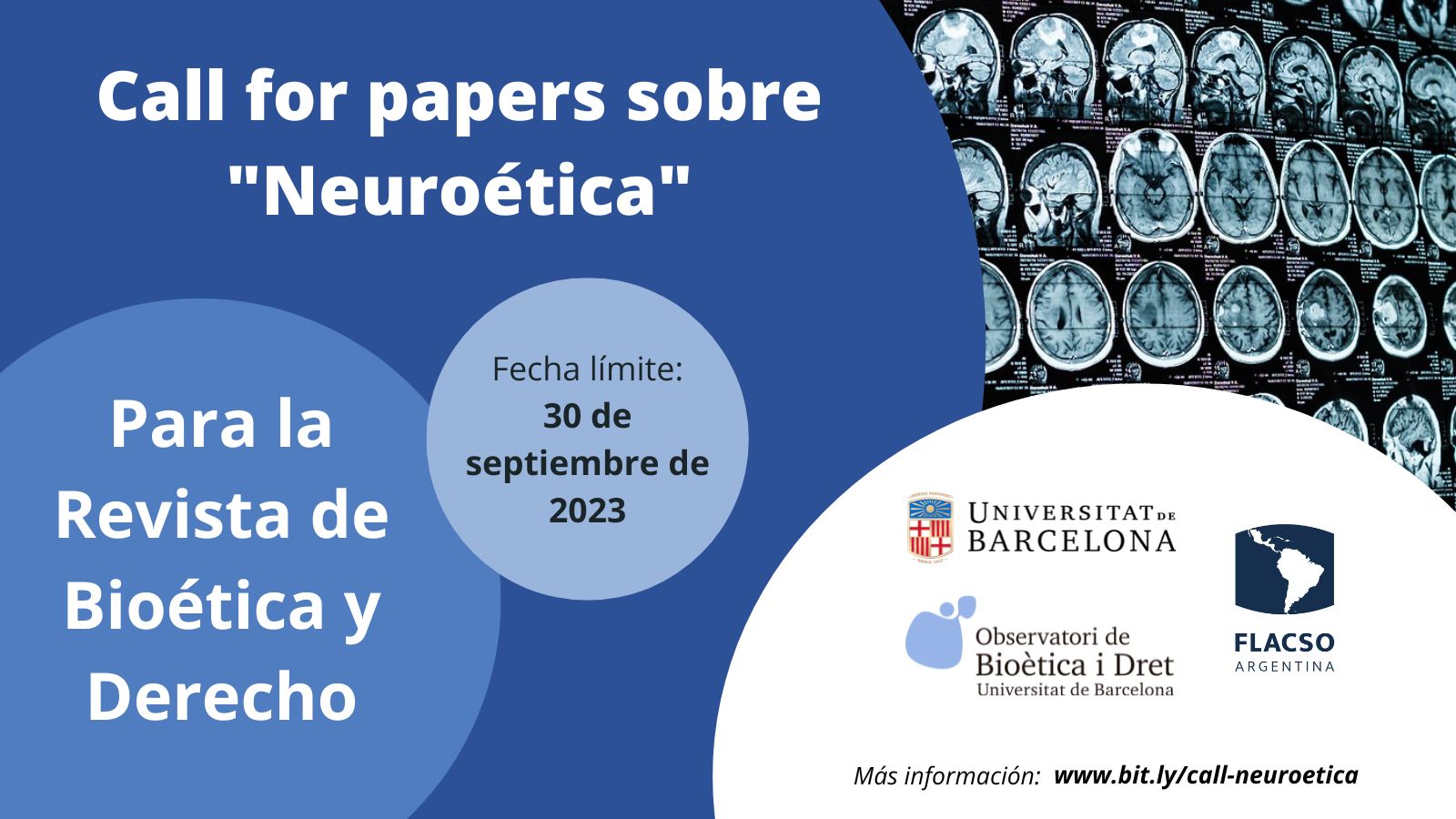 Research and knowledge in neurosciences have been undergoing an overwhelming development for about twenty years. The convergence of technologies, the advancement of brain imaging processes, chemical-metabolic markers, genetic technologies, computational sciences, as well as mathematical modelling and artificial intelligence, have produced once unthinkable changes in the understanding of the brain and its functioning.
Research and knowledge in neurosciences have been undergoing an overwhelming development for about twenty years. The convergence of technologies, the advancement of brain imaging processes, chemical-metabolic markers, genetic technologies, computational sciences, as well as mathematical modelling and artificial intelligence, have produced once unthinkable changes in the understanding of the brain and its functioning.In the last few years, the development of technologies associated with supercomputers and the processing of large databases has shown that functional research on the human brain is feasible and that processes of intervention and functional modification will continue to make inroads in the clinical setting and beyond.
The vertiginous progress in understanding the functionality of neural networks, the construction of artificial intelligence models, have already had a major impact on health and offer future possibilities for modulation, modification, decoding-reading and perhaps the production of logical intelligences that could at least compete with human intelligence.
Given these realities, bioethics needs to reflect on the issues related to the development of these new technologies and their convergence.The journal invites sending original articles that explore, from an interdisciplinary perspective, the scientific, ethical, legal, and social aspects of neuroscience and neurotechnology, such as:- The development of read-write technologies on the brain.- DNA technologies and their modification in relation to human beings.- The impact and development of AI technologies.- Diagnostic and therapeutic processes on the human brain.- Enhancement technology and human competence.- Potential brain-machine, brain-computer interaction techniques (BCIs).- The bioethical (ethical, legal, social, and political) implications of the use of neurodata and the impact on privacy.- Basic and applied research in neuroscience and neurotechnologies.The journal will accept only original papers written in Spanish, Catalan, French, English, Portuguese or Italian, with a maximum length of 6,000 words (excluding abstract, keywords, notes, references, bibliography, funding). The file must be sent in MS Word format, font Cambria or Arial 12, 1.5 spaced, thoroughly following the guidelines for authors.
Articles must be sent through this link to the “Monographic Dossier” section. They will be peer-reviewed and those that pass the selection process will be accepted for publication.-
Deadline for submissions: September 30, 2023 (1 p. m. CET)
-
Open Seminar of the Multidisciplinary Working Group that advised the Ministry of Science and Innovation of Spain on scientific matters related to COVID-19 and its future consequences (in-person and online)
This June 15, 2023, at 5 p.m., the Bioethics and Law Observatory (Observatorio de Bioética y Derecho - OBD) - UNESCO Chair in Bioethics, and the Master in Bioethics and Law of the University of Barcelona are organizing the Seminar of the Multidisciplinary Working Group (MWG) that advised and supported the Ministry of Science and Innovation of the Government of Spain on scientific matters related to COVID-19 and its future consequences.Dr. Itziar de Lecuona, associate professor of the Medicine Department and director of the Bioethics and Law Observatory at the University of Barcelona, was part of this advisory team (2020-2022).
Its members will gather together, at this seminar, to discuss the contributions and lessons learned from their work during the COVID-19 pandemic.
You can find the rest of the group members and the scientific reports they produced at this link.
Access to the seminar is free, upon registration, and will take place both in-person and remotely. Registration forms to attend or connect to the event are now open.
- Date and time: Thursday, June 15, 2023, at 5 p.m. (Spain time, CEST, UTC+2)
- Hybrid format:
- In-person: at the Aula Magna of the Faculty of Medicine and Health Sciences, Medicine Campus of the University of Barcelona (Casanova 143, 08036 Barcelona). Form is closed
- Online: live broadcast on YouTube. Form is closed
-
Watch full video of the seminar
-
XVII International Seminar of the UNESCO Chair in Bioethics of the University of Barcelona: “Universal Declaration on Bioethics and Human Rights and neuroethics”
On February 9, 2023, the Bioethics and Law Observatory (OBD) - UNESCO Chair in Bioethics of the University of Barcelona organizes the XVII International Seminar of the UNESCO Chair in Bioethics: “Universal Declaration on Bioethics and Human Rights and neuroethics”.
The seminar is free, with prior registration, and will be held in a hybrid format, both in-person and online.
Check out the full program here.
Theme:
After the decade of the brain, neuroscience research showed unthinkable technological advances, opening the way for the unavoidable need for multidisciplinary work in research applied to the field of health, particularly in neurosciences.
Important changes regarding the diagnosis, intervention, and recovery of neurological diseases are already occurring and are expected. Neuroscience research also shows future advances around mental health and the chance of developing multidimensional techniques that make it possible to establish accurate diagnoses and even new therapeutic possibilities.
Research around the brain (in particular, the human one) demands generous funding, suggesting that a variety of actors and institutions understand that neuroscience has a significant potential to improve neuroscience therapeutic practices in the clinical and surgical fields.
In any case, there is also a current of intense skepticism regarding the offers (diagnostic and therapeutic), which goes hand in hand with the uncertainties still associated with this field of research and its impact on the “real” world of medicine: human rights, privacy, autonomy, interference and manipulation, as well as, of course, equality.
-
Date and time: Thursday, February 9, 2023, at 5:00 p.m. (Spanish time, UTC+1)
-
Hybrid format:
-
In-person: Aula Magna, Faculty of Medicine and Health Sciences, Medicine Campus, University of Barcelona (Casanova 143, 08036 Barcelona). Limited capacity
-
Online: live broadcast. The link will be provided by email, prior registration
-
-
Forms are closed
-
-
Itziar de Lecuona has been selected to be part of the group of experts supporting the European Data Protection Board (EDPB)
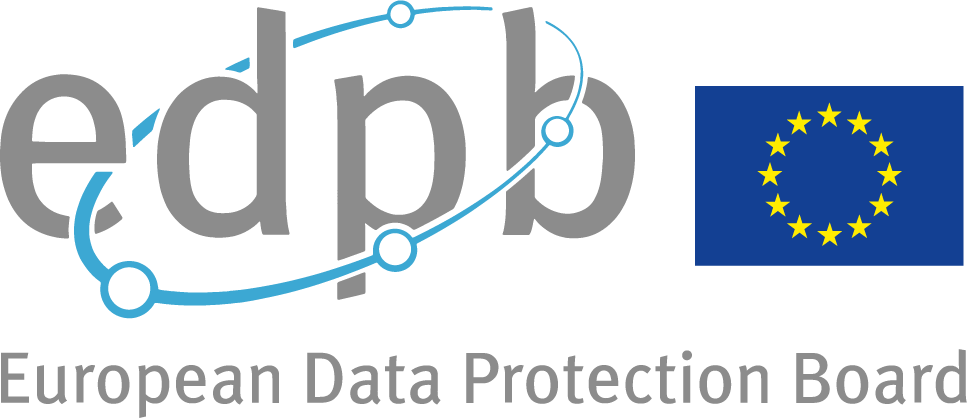 Dr. Itziar de Lecuona, associate professor of the Department of Medicine and director of the Bioethics and Law Observatory at the University of Barcelona, has been selected to be part of the group of experts supporting the European Data Protection Board (EDPB).
Dr. Itziar de Lecuona, associate professor of the Department of Medicine and director of the Bioethics and Law Observatory at the University of Barcelona, has been selected to be part of the group of experts supporting the European Data Protection Board (EDPB). -
Publication of the infographic based on the document "Guidelines for reviewing health research and innovation projects that use emergent technologies and personal data"
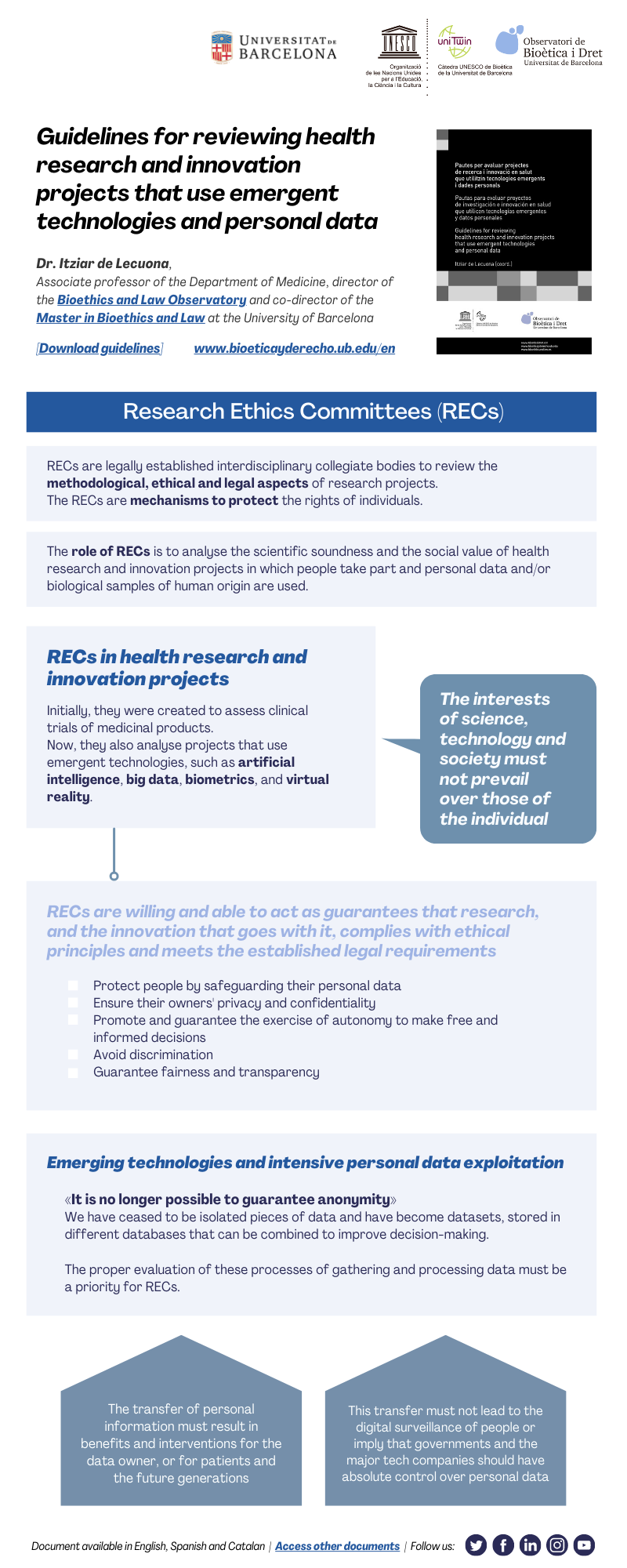 The infographic based on the document "Guidelines for reviewing health research and innovation projects that use emergent technologies and personal data", published by the Bioethics and Law Observatory - UNESCO Chair in Bioethics of the University of Barcelona and coordinated by Dr. Itziar de Lecuona, was presented within the framework of the seminar "Artificial intelligence and data protection in health research and innovation: ethical, legal and social aspects", on September 21, 2022.
The infographic based on the document "Guidelines for reviewing health research and innovation projects that use emergent technologies and personal data", published by the Bioethics and Law Observatory - UNESCO Chair in Bioethics of the University of Barcelona and coordinated by Dr. Itziar de Lecuona, was presented within the framework of the seminar "Artificial intelligence and data protection in health research and innovation: ethical, legal and social aspects", on September 21, 2022.Dr. Itziar de Lecuona, associate professor of the Department of Medicine, director of the Bioethics and Law Observatory and co-director of the Master in Bioethics and Law at the University of Barcelona, showed the infographic, which synthesizes and highlights the essential points developed in the document, during her lecture "Research ethics committees and data protection in the evaluation of emerging technologies in health research and innovation".
In this way, the infographic exposes, in a visual and concise way, what Research Ethics Committees (RECs) are, their functions, and the dilemmas that health research and innovation projects raise, especially in a scenario where emerging technologies and the exploitation of personal data play a leading role.
The infographic presents the challenges that Research Ethics Committees (RECs) must face (avoid the Europe's excessive dependence on the American tech companies, update the obsolete protocols for obtaining informed consent, etc.); and lists a series of recommendations so that RECs can perform their functions correctly and efficiently, with the support of both research and innovation centres and legislators, to guarantee the protection of the rights of individuals in projects that use emerging technologies, such as artificial intelligence, big data, biometrics, and/or virtual reality.-
Access the document "Guidelines for reviewing health research and innovation projects that use emergent technologies and personal data" (available in English, Spanish and Catalan)
-
See and download the infographic
-
The infographic is also available in Spanish and Catalan
-
Opening of the 2022/2023 academic year of the Master in Bioethics and Law: Practical lecture on bioethical aspects in biomedical research projects funded by the European Union's Horizon 2020 programme, taught by Itziar de Lecuona
 The opening of the 2022/2023 academic year of the University of Barcelona's Master in Bioethics and Law will take place on October 25, 2022.
The opening of the 2022/2023 academic year of the University of Barcelona's Master in Bioethics and Law will take place on October 25, 2022.Dr. Itziar de Lecuona, associate professor of the Department of Medicine, director of the Bioethics and Law Observatory and co-director of the Master in Bioethics and Law at the University of Barcelona, will give a practical lecture on bioethical aspects in biomedical research projects funded by the European Union's Horizon 2020 programme.
The Bioethics and Law Observatory (OBD) - UNESCO Chair in Bioethics leads work packages in European projects funded by competitive calls for research and innovation. On this occasion, Dr. Itziar de Lecuona will analyze the contributions provided and the results of the two European projects on biomedical research currently underway: MICROB-PREDICT and DECISION.
This session will be held exclusively for new students of the Master in Bioethics and Law, and for researchers and doctoral students from the Bioethics and Law Observatory.
It will allow the attendees to identify which contributions they could provide from bioethics, based on their profile and knowledge, in the different phases of the project, within the framework of the respective Work Packages on "Ethics, Health and Socioeconomics". It will intend to train and improve their skills in bioethics in the field of research ethics, scientific integrity and responsible research and innovation.
-
Date and time: Tuesday, October 25, 2022, at 6:00 p.m. (Spanish time, UTC+2)
-
Place: hybrid format: in-person at the Salón de Grados of the Faculty of Law of the University of Barcelona (Diagonal, 684, 08034 Barcelona), and live broadcast (Zoom)
Open access materials for the session:
-


